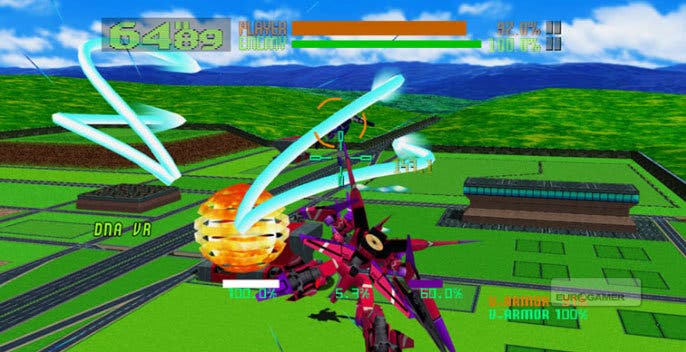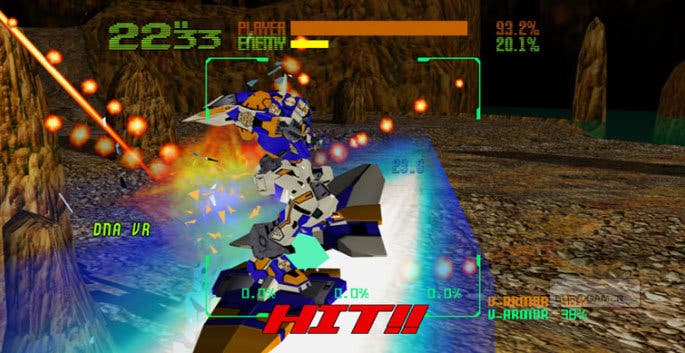Virtual On: Oratorio Tangram
Heavy Metal.
The keywords for today are "acquired taste". For those with the willingness to battle through the crunchy exterior of this cult Japanese confection there's a lovely nougaty centre of deep, thrilling combat gameplay to be savoured. Many more, however, will struggle to get past the experience of being pummelled to bits over and over again while that metallic shaaaa-ching sound effect that punctuates every anime movie ever made echoes in their ears.
VOOT, to use its hilarious acronym, is a mech-based fighting game from 1998, helping to establish a template that later games like Armored Core and Zone of the Enders would embellish in their own little ways. The original game was released as an arcade cabinet in 1995, but what we have here is an adaptation of the Dreamcast port of the arcade version (v5.66 if you want to be precise) of the second title in the series. The weapon of choice in these one-on-one confrontations are giant robots called Virtuaroids, each of which comes with its own array of weaponry, while battles take place in medium-sized 3D arenas, ranging from the mineshafts, underwater bases and rural motorways.
In true arcade style, the countdown finishes and it's straight into action. As well as the expected block and jump buttons (rather awkwardly mapped to the A and Y buttons respectively in the default control scheme) you get three attack options. The triggers handle these, with left and right operating the weaponry on either side of your Virtuaroid while a tug on both summons a more powerful attack. You can also turbo-dodge using X. That's really all there is to the basics, but as with all fighting games the long-term pleasures come from the tactical depth that unfurls once you start understanding the various strengths and weaknesses of each character.

It's not that the game moves especially fast, though. These are enormous metal warriors and while they're much more nimble than the lumbering combatants of Armored Core, it's not exactly Robot Street Fighter - they still move with a tangible sense of weight. Instead the sense of blistering pace comes from the arcade urgency of the presentation, and the speed with which a bout can be turned around with the right volley of attacks. Turbo in close, send your opponent flying with a close-quarters melee attack, then hit them with ranged attacks as they try to get their bearings, and you can do the proverbial MASSIVE DAMAGE very quickly.
Of course, the reverse is also true and it's here that the game is likely to shed a number of potential fans. So much of the appeal comes from the nuances of choosing the right Virtuaroid for each bout, yet the only way to gain this knowledge is through trial and error, taking punishing loss after punishing loss as you feel your way around the different tactical advantages of each weapon-set. There's a non-interactive tutorial, a practice mode and the option to spectate on AI-only matches (or rewatch saved bouts and the last match played), but the learning curve is still ferociously steep and those who don't come to the world of Virtual On with their hearts already on their sleeve may not find enough entertainment in this initial uphill battle to justify sticking around. Unlike the more inviting structure of Soulcalibur, the broadly similar cult Dreamcast offering also on Live Arcade, there's a lot more stick than carrot being used here.

This is less of a problem in multiplayer where human error helps to level the playing field. There's the expected Xbox Live options - although the options are basic at best - but System Link is your only chance for local play. That's a shame, since this is the sort of game that would benefit hugely from split-screen play. Battling a flesh-and-blood opponent at least gives you the chance to appreciate the appealing graphical style, with those pristine SEGA colours and crisp designs shining in their new high-definition format. The environments are perhaps a little bland, but the Virtuaroids are a treat for mech-loving otaku, designed as they are by Gundam's Hajime Katoki.
Virtual On's focus is narrow and deep, which automatically makes its niche very specific. It thoroughly shames the shabby likes of War World, and both existing fans, and newcomers who warm to its single-minded style, will find a strategically rich combat game with lots of long term appeal. Most, however, will probably be left a little cold by the frenetic pace and fierce learning curve, especially at 1200 Microsoft Points - around ten quid. A really great game, but emphatically not one for everybody. Thank goodness for trial versions.

